red rope knot
【Oceania】The tragedy and forgiveness of a Wycliffe Bible Translator family
Photo courtesy/Grace Fabian
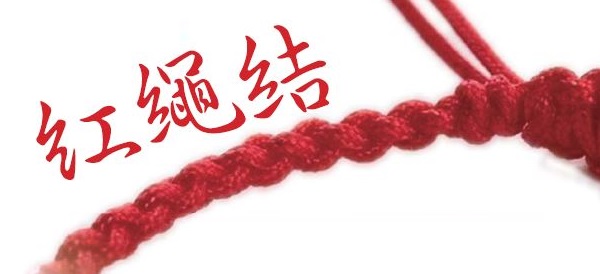
There were two rows of hibiscus flowers, and the fragrance of frangipani was astonishing. The Nabak People, New Guinea, men, women, old and young, dressed in aboriginal attire, gathered at the gathering place, beat drums, danced, sang, and praised loudly. Celebrates the publication of the translation of the New Testament into the native language of the Naba'k people. Boxes of New Testaments wrapped in red cloth and tied with red ropes were placed on the table. A respectable old father tremblingly took the first Bible in the native language of the Nabahi people and said with tears: "This is what I have been waiting for. Now that I have seen this book, I can go!"
The Nabak people are accustomed to knotting straw ropes on the items being traded as signs to show their commitment or a treaty between the two parties. Today, they use the red rope to represent the precious blood of Christ. They are firmly tied to God through the red rope and make a covenant with Him. Therefore, the "New Testament" translated into Nabaq is "God's New Knot".
Who first picked up this long rope and led the Nabaq people to tie this knot of peace with their gods?
angel of gospel
Edmund Fabian, who was originally a male nurse, received language training from Wycliffe Bible Translators and met Grace Jones, who had been working as a Mayan translator in southern Mexico and returned to the United States. She also received training from the Summer Institute of Linquistics. She fell in love with Fei Demeng at first sight and they were like-minded, so they got married in 1967.
Two years later, Federmon and his wife, who was eight months pregnant, arrived in Papua New Guinea, Oceania, to translate the Bible into their native language for the Nabak aboriginal people, with a population of only 25,000. Many people in developed and wealthy countries regard the existence of a Bible as commonplace and do not take it seriously. However, before computers, translating the Bible often required hundreds of manpower and took 25 to 40 years. It would still take fifteen to twenty years before computers were available. Even in China, which has a long history of more than 5,000 years, splendid culture and scholarship, the Union Version of the Bible, the most popular among churches and believers, took 27 years of hard work to complete. The difficulty of translation is evident.
Translators must live in the primitive tribes of the aboriginal people, endure the backward sanitary environment and living conditions, and beware of the threats and diseases of malaria, dengue fever, and cholera. In addition, we must accept the prying eyes of curious natives, ignore the inconvenience caused by the loss of privacy, and even learn to be tolerant when facing hostility, imitating the generosity of the Lord Jesus.
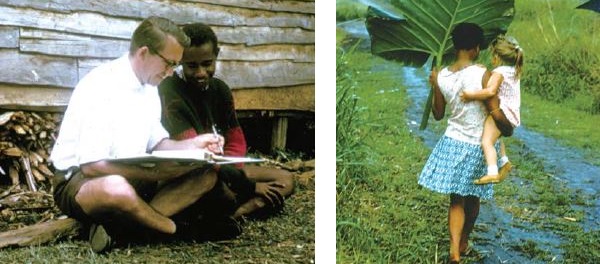
▲ (Left) Fei Demeng and young Ren Bei were sitting outside Fei’s house translating the Bible. Ren Beijin is a translation consultant and is studying Hebrew at the University of Jerusalem in Israel, determined to complete the translation of the Old Testament for the Napaq people.
▲ (right) The four children of the Fei family all grew up among the Naba Ke people. In the picture, a Napa girl holds Fetiling and uses taro leaves to protect her from the rain.
Plowing the fields diligently in the threshing field
The Fei couple observed the life details and cultural customs of the local people. Like their son Fei Jie (Jonathan) who was learning to speak, they pointed east and west and asked the indigenous people: "What is this?" After seven months, they only learned " That's a finger." It turns out that the habit of the Napa Ke people is to nod with their chin to indicate something, without using their "hands" to point at things. Breaking through cultural barriers, integrating into local life, and learning the local language are the most basic and important aspects of a translator. In addition to the long accumulation and great endurance to think about, the ingenuity of Nabahi women in weaving rope baskets must also be added With wisdom.
The Nabak aboriginal people only have a spoken language and no written language. Although they only have six vowels and twenty-six consonants, the word "carry" alone has more than twenty variations. The permutations and combinations of complex variables are really annoying! No wonder some language researchers point out that Napaq is one of the most difficult languages to learn in the world. Fei maintained a cautious and serious attitude toward Bible translation. He carried a tape recorder with him and recorded indigenous conversations on various occasions. He wrote them in pinyin on cards, stored them in shoeboxes, and then organized and summarized them. The dialect pronunciation model is established according to a scientific system to ensure consistent translation. After the translation is completed, it is read and proofread over and over again with local colleagues, and finally sent to Wycliffe headquarters for review, in order to achieve the state of honesty, expressiveness and elegance.
Fei's translation of the New Testament in Papua took more than 20 years of work, from being complicated and confusing to being step-by-step and clear-cut. They are not only Bible translators, but also English teachers. They are also medical workers who deliver babies and treat illnesses, mechanics who repair appliances, and social service workers who connect water pipes to benefit the tribes. This period of translation can be said to be a mixture of sorrow and joy. I am happy that I gave birth to two more daughters and a son. I am sad that my beloved local translator Zumbek has left to study in the seminary. I blame myself for seeing her return. The woman who had no time to know God died in childbirth; the most heartbreaking thing was that a fellow Aboriginal translator who was like a brother and was the most capable died of liver cancer.
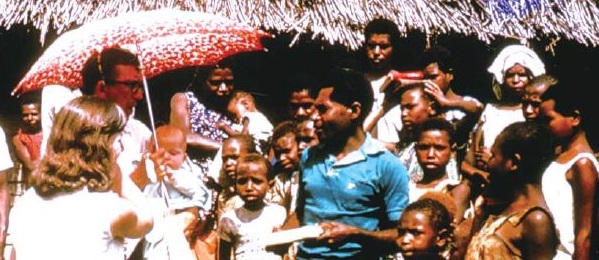
▲ Demeng and Guisi took Feijie and settled in the Nabaq tribe to learn the local language.
sting of death
Felix has experienced numerous ups and downs in life: she almost died due to a hemorrhage during childbirth, attacks from heretics, petty theft, evil neighbors who smashed the house and set it on fire, bullies who occupied her, and threats from evil forces. The logo of the American Baptist Foreign Missions Association shows an ox standing between a plow (working for the Lord) and a smoking altar (martyrdom for the Lord), with the words "Ready for either" written across the cross. They have long been mentally prepared to dedicate themselves to serving as foreign missionaries and serve throughout their lives.
It's just that the attack of this "fatal tsunami" caught her off guard, completely destroying the safe haven she relied on and tearing apart the world she carefully planned. In the quiet ward, Fei Demeng's blood splashed drop by drop on the blood basin under the bed, hitting her heart, like an accelerating second hand urging her to leave. She and the children waited helplessly for the brain-dead Fedemon to bleed out so that the doctor could declare him dead.
Fei Demeng devoted the most precious years of his life to thinking about how to translate the Bible appropriately and painstakingly, in order to let the Nabaq people he loved feel the love of God. In 1993, when he was thinking about "The True Meaning of Love" in Chapter 13 of 1 Corinthians, Satan's anger actually used the confused hands of a competent translator to lift an ax and strike at the back of Feidemon's head. go. At that moment, Feguis was puzzled and shouted in her heart: "On the afternoon of April 29th, God, where were you hiding?" Why did you let your beloved husband die at the hands of the Napa Ke people whom they served with all their heart?
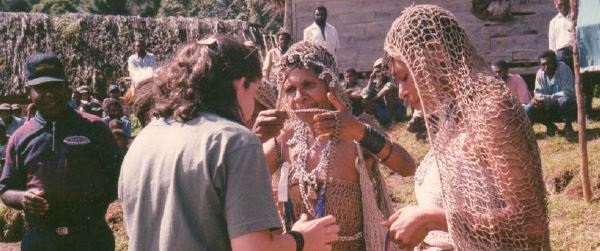
▲Mutalac, the wife of Fedemon’s murderer, apologized to Faguis in front of her tribe and asked to become a sister. During the solemn reconciliation ceremony, Mutalac (second from right) presented an ancestral heirloom to Guise’s daughter Fetiling (the one with her back to the camera).
we forgive you
Sorrow and forgiveness were both new to her. He lost his mother when he was young; his eldest sister was hit and killed by a speeding police car when she was three years old. In court, the pastor's father said, "Forgive him!"; another sister died due to the wrong blood type during a blood transfusion, but his father still insisted on "forgive".
Forgiveness is not easy. When I accidentally touched my husband's computer, Chapter 13 of 1 Corinthians, "The True Meaning of Love," jumped out of the screen. Bitterness, pain, self-pity, and injustice stirred in her heart. How many times did she cry and mourn in front of God. God’s words clearly said: “If you do not forgive your brothers from your heart, my heavenly Father will do the same to you. ” (Matthew 18:35) Felix thought about herself as a Bible translator. If her life has nothing to do with the truth she translates, and if she cannot live out the words of God she translates, then all the hard work she has put in will be gone. Helping the Naba Ke people in this life is like a ringing gong or a clanging cymbal. What benefit does it have to them?
The heavenly fragrance exuding from her father not only subtly influenced the entire church at that time, but also deeply infected her family. It was like a hidden spring flowing in the depths of her heart. Just as David helped his son Solomon prepare materials for building the temple, his father also prepared the gold bricks of "forgiveness" for her. Figuis hoped that her children could also inherit this priceless treasure. When she and her four children went to visit the prison, they saw a killer who had been tortured by mental illness for a long time and was now full of shame, emaciated and deformed. He held his hand and said, "I forgive you!"
God’s infinite love
Feidemeng's death, at first glance, was caused by a missing needle when knitting the straw rope, which is regrettable. Suddenly losing the "holding hands" together, the translation stopped in sadness. The eldest son Fei Jie held a memorial service for his father in an American church. The pastor picked up a pair of shoes and said, "Fei Jie is already in the glory of God. Who wants to put on his shoes and continue his footsteps of preaching the gospel?" Fei Jie Jay stepped forward to put on the shoes, took his wife and children, and returned to his familiar birthplace. The Nabaq dialect was no stranger to him, and he and his mother knitted the unfinished "knot" of his father's heart. After two generations of hard work and twenty-nine years, the Nabaq people’s New Testament mother-tongue Bible was finally completed.
Ren Bei, a Napaxi co-worker who studied theology, couldn’t help but admire after reading the book of Romans in his mother tongue: “I used to read the Bible in English and only saw the surface of the branches and leaves, but now in my mother tongue, I can deeply explore the essence hidden at the root. ” This is in line with the vision of Wycliffe Bible Translators: to translate God’s words into the familiar languages of all ethnic groups and speak to the hearts of people of all ethnic groups.
Feijie assisted his mother in dubbing "The Life of Jesus" produced by Wycliffe's partner agency Jungle Aviation and Radio Services (JAARS), and walked through fifty-three Napaq tribes in six weeks. , showing the first film pronounced in the Napaq language. After watching the movie, the patriarch, who had been thinking all night and could not sleep, declared to his tribe with enlightenment: "The true meaning of Christ's death on the cross for our sins has returned to us today through Fei Jie, conveying the Fei family's forgiveness to our tribe. In the blood feud of patricide, God’s great love has been clearly demonstrated.”
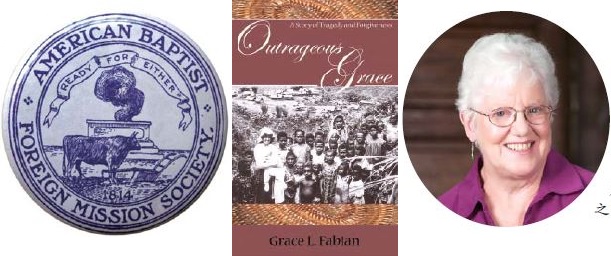
▲ (Left) The logo of the American Baptist Foreign Mission Association has an ox standing between a plow (working for the Lord) and a smoking altar (martyrdom for the Lord), with the words "Ready, both All are OK.”
Image source: http://www.internationalministries.org/uploads/picture/asset/11781/large_img_6741c2.jpg
▲ (Chinese) "Outrageous Grace, A Story of Tragedy and Forgiveness" by Fei Guisi (tentative translation)
▲ (right) Priest Freddie now lives in Pennsylvania, USA. She is often invited to give lectures and enjoys the joy of having children and grandchildren around her in her free time.
Offer love on the altar
In 2005, Felix returned to the United States to settle. The Old Testament translation ministry in Papua was handed over to a committee that included Napaq believers trained by the couple.
Although life is short and sometimes fleeting, God's love continues through these fleeting flashes of life that He has chosen. The blood of Fredmund's martyrdom is like a ruby set in the hole of a leaky needle, shining brightly.
The most difficult thing in the translation process is metaphysical thoughts and ideas. "On the afternoon of April 29, 1993, God! Where were you hiding?" Now Feguis has the answer: "You are with me, accept my offer of my favorite, be covered in front of the altar, and become your fragrance. "Sacrifice." Because He knew that the Napa Ke people must experience tangible testimony before they can understand God's boundless grace.
postscript:
This article is made possible with the permission of Reverend Ferdinand Ferdinand to use her autobiography and to provide photos through her daughter Dietlinde Fabian Hoffman, and is also acknowledged. Welcome to order this shocking and well-reviewed English book online: www.gracefabian.com
Click to read more articles about caring for indigenous people around the world.

Liu Shuman, her husband, three children and dogs are the flowers in her heart, her kitchen is her chemistry laboratory, and her interviewing and writing is her cinema. Learn to serve like bees gathering honey in joy.
